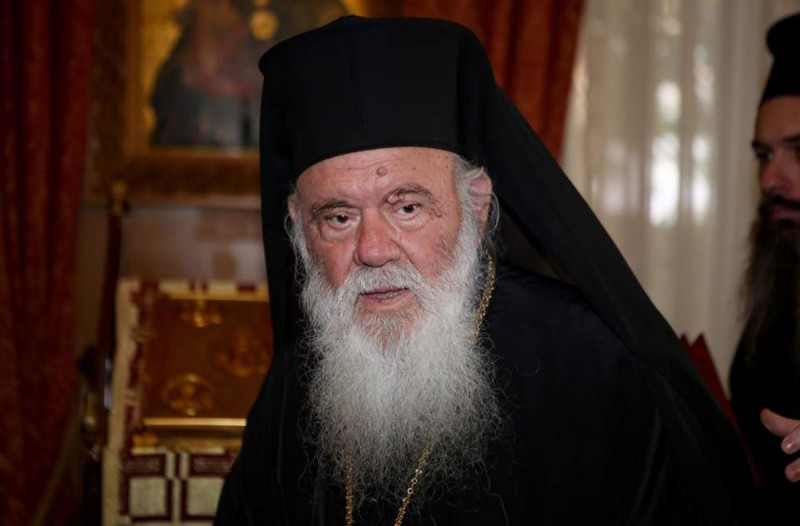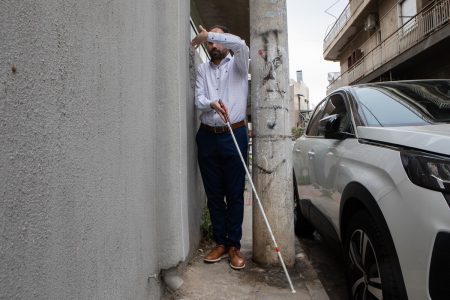By George Gilson
Back in the early 1980’s when Archbishop Seraphim was at the height of his power and clashing openly (and successfully) with Andreas Papandreou over his bid for state expropriation of monastic lands and properties (attempted by his ill-fated minister Antonis Tritsis) ) Church-State relations were sorely tested.
The monasteries were vindicated finally in the European Court of Human Rights.
‘Τhe church is like coal, it burns you when lit, soils you when cold’
Seraphim famously quipped at the time that the Church of Greece is like a piece of coal. If you touch it when lit you are burned and if you touch it cold you are soiled.
In short you can’t beat the Church either way.
The triumvirate with two archbishops
At the time a three-member committee comprised of Metropolitan Christodoulos of Dimitrias (Volos), Ieronymus of Thebes, and Anthimos of Alexandroupolis (Christodoulos backed his election as Metropolitan of Thessaloniki) represented the Church in its battle with the state, and they all addressed huge crowds from a balcony at the height of the strife.
The first two later served as archbishop, in the order cited.
The current archbishop in the past complained that the camp of his main opponent Christodoulos concocted a bogus church finances scandal so as to besmirch and torpedo the candidacy of Ieronymos, who chaired the finance committee.
Ieronymos was later vindicated in the courts but Christodoulos was archbishop.
Anthimos is unable to keep up the pace of his earlier years but remains as bishop of the Church of Thessaloniki.
Its patron saint is Saint Demetrius whose relic is preserved and venerated especially on his 26 October feastday in the northern port city, Greece’s second largest.
The President of the Republic has annually attended the accompanying military parade that marks the liberation of Thessaloniki and the city is a crucial part of national and economic life as the top commercial hub of the Balkans.
The PM and the Archbishop
In the initial phase of the coronavirus pandemic the office of the prime minister is said to have exerted heavy pressure on the archbishop who in turn conveyed it to the 12-member Permanent Holy Synod.
Ieronymos was on board from the start albeit with heavy heart and he could more effectively persuade and cajole the smaller day-to-day-business executive organ of the Church than the 80 some Metropolitan bishops who together constitute the highest administrative organ of the Church.
The archbishop is first among equals and bishops exercise absolute rule in their bishoprics.
Yet Ieronymos managed to get his 12 fellow-bishops on board and ensured through feverish contacts at many levels the tacit consent of hierarchy for the closure of churches even during Holy Week and on Easter.
The patience of the elderly church conclave wore thin, however, as the state opened commercial enterprises but offered no specific date for the resumption of services at Orthodox Churches, just a decision allowing individual prayer in churches as of 4 May.
The straw that broke the camel’s back was the public appearnance of a truck-muiscal caravan with the inspiring tones of top pop artist Alkistis Protopsalti, which was called to play before the office of the PM who exited and applauded the singer as dozens of bystanders weren’t obeying social distancing rules.
The hierarchy was outraged that the government could ban the most sacred annual litany of the «epitaphios» bier of Christ» but permit Protopsalti’s roving band of musicians.
A letter previously sent by Ieronymos to Mitsotakis on 22 April, requesting a rapid understanding with the state, received no reply until the PM on 28 April gave the archbishop the 17 May starting date, but only after a ruckus.
Muslim, Jewish, and other confessions’ places of prayer will also open on 17 Mayand indeed at the height of Ramazan, when social distancing measures must be enforced effectively.
Ierotheos strikes on behalf of hierarchy
Holy Synod spokesman Metropolitan Ierotheos of Nafpaktos borrowed a Weberian scheme to argue that there are three powers – the legal authority of the state, traditional authority (patriarchy etc.),m and charismatic authority.
Ierotheos claimed the second and third for the Church which he suggested had been slighted and insulted.
“Is the Church a hair salon or a supermarket? Is it just an organisation of people? Let them [the government] tell us how they view us,” Ierotheos declared, causing jitters in the government at a time when a row with the Church would greatly hinder the necessary cooperation.
Church’s critical social role
The Church has offered invaluable assistance to the state in handling poverty and hunger during the decade-long economic crisis and is expected to do the same in the dawning crisis so the PM has absolutely no interest in picking a fight with the bishops (nor do they for that matter).
That was stressed by the PM’s sister Dora Bakoyannis, – a New Democracy MP who has served as foreign minister after serving as Mayor of Athens (a post her son Pavlos Bakoyannis holds now).
Bakoyannis extolled the stance of the Church as regards compliance with pandemic public health measures and she underlined the exceptional importance of keeping it that way.





